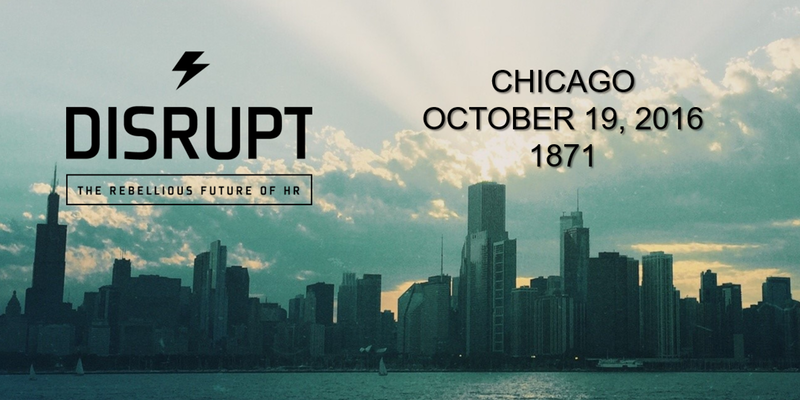
“Disruption” is trendy. It’s everywhere. Even in HR. But what does it really mean? What is disruptive in HR? Who is the judge of what is truly game-changing and what is not?
After the launch of our inaugural DisruptHR Chicago event in April of this year I found myself reflecting on and discussing these questions with passionate members of our newly formed tribe of HR innovators.
The theme that emerged is that what appears disruptive in HR to one person seems quite common practice to another. One explanation for this is that there is little clarity around what disruption in HR really means.
A few years ago, the term disruption emerged in the start-up world and is often treated synonymously with “innovation”. Clay Christensen, a Harvard Business School professor, defines “disruption” in his 2011 book The Innovator’s Dilemma as a product that addresses a market that previously couldn’t be served — a new-market disruption — or something that offers a simpler, cheaper or more convenient alternative to an existing product — a low-end disruption.
So, what does disruption mean to HR?
I turned to a few experts from the DisruptHR Chicago community to help shed some light on the matter.
Disruption in HR means staying relevant. Eric Doctors, SVP Leadership and Organizational Development at Leo Burnett, attended our first DisruptHR Chicago event and has since become a passionate volunteer. He believes that “HR is like any life force. It needs to evolve to remain relevant and effective. But HR tends to have a lot of inertia and resist changes due to legal and compliance requirements, systems and processes that are hard to change. Disruption is an organic force that can introduce change that is totally relevant and leap over all those reasons not to change.”
Disruption in HR is not about HR. “Disruptive HR is not primarily about what serves HR. It is about what serves organizational success and provides the best experience for people working in the organization,” states Dorie Blesoff, Chief People Officer at kCura and upcoming DisruptHR Chicago speaker.
Disruption in HR requires new solutions to old problems. Tom Kuczmarksi, co-founder of Chicago Innovation Awards and former DisruptHR Chicago speaker, says: “Disruption in HR for me means thinking of new and innovative ways to attract, retain, motivate, and optimize talent. It is about thinking of new programs, new processes, new incentives and reward programs, new forms of communications and new forms of praise for employees and managers.”
Disruption in HR stands for being human. “At the heart of HR is a human aspect felt by no other profession as profoundly as ours. Disruptive HR shouldn’t be the exception. It should be the rule. Every company should have a profound culture with room for growth opportunities and human connection. That shouldn’t be disruptive. That should frankly be a given, and if it’s not, best believe your people will jump to other lily pads,” concludes Elena Valentine, Co-Founder of Skill Scout and former DisruptHR Chicago speaker.
Now, what are steps HR professionals and organizations can take to become disruptive in their people function and practices?
STEP #1: Look outside of HR for inspiration. In order for HR to move into “new market disruption” status per Christensen’s definition we need to fundamentally re-think models of value creation for the function. Collaborate with Finance to design a talent value creation model. Take a page from Marketing and segment your candidate/employee base to design targeted talent strategies. Consider new segments previously deemed as “out of scope” for HR (e.g. freelancers). Stop going to the same, old HR conferences. Instead, attend entrepreneurial meet-ups (e.g. 1871 events), innovation gatherings (e.g. Chicago Innovation Awards), or design-oriented conferences (e.g. Cusp Conference).
STEP #2: Keep abreast of external trends. HR as we know it is being disrupted by external forces. Technology (e.g. Internet of Things, Artificial Intelligence) and big data/analytics as well as changing work demands of the millennial generation are just some examples. “All of these can essentially change the prevailing assumptions or the daily experience of internal customers and drive change in how HR fulfills its purpose,” seconds Dorie Blesoff. This means HR professionals need to become students of external trends to determine how the function needs to change to adapt today and in the future.
STEP #3: Make the switch from talent management to talent experience. Airbnb’s HR organization famously pivoted into an employee experience function. One could argue this example qualifies as a new market disruption per Christensen’s definition. Even if your organization isn’t ready for a full business model switch, there are low-hanging fruit in creating an end-to-end talent experience, a concept I have written about before and that’s an integral part of talent.imperative’s consulting approach.
STEP #4: Enable managers to be disruptive talent leaders. “I don’t view HR as the owners of talent or talent practices. So anybody could get in the game. I have seen senior line managers declare that they are going to lead their teams based on fundamentally different principles and affect great change and I have seen large scale disruption come from grass-roots efforts where an individual has tried a new approach that was a new way of managing or developing talent and others emulate it because it is so effective,” outlines Eric Doctors. Learn how to build what I call “talent.driven leadership” capability inside your organization here.
STEP #5: Join a community of HR innovators and find your voice. Disruption doesn’t happen in a vacuum. In order to innovate you need to be able to test your ideas with like-minded people. I have searched long and hard for my tribe in HR. For now, I’ve found it in the future of work CHREATE community founded by USC Professor John Boudreau and DisruptHR Chicago. On October 19, eleven speakers once again will take the DisruptHR Chicago stage to share with us their ideas – some disruptive, others inspirational, yet others empowering. They all have one thing in common that Dr. Melanie Peacock , one of our DisruptHR Chicago Twitter followers, describes as: “Did she really just say that? Take people out of their comfort zone.”
These five tips are probably mere stepping stones on the journey towards true disruption in HR.
I am fine with that.
What do you think? What does disruption in HR mean to you? What examples of innovative HR practices can you share with the community?

